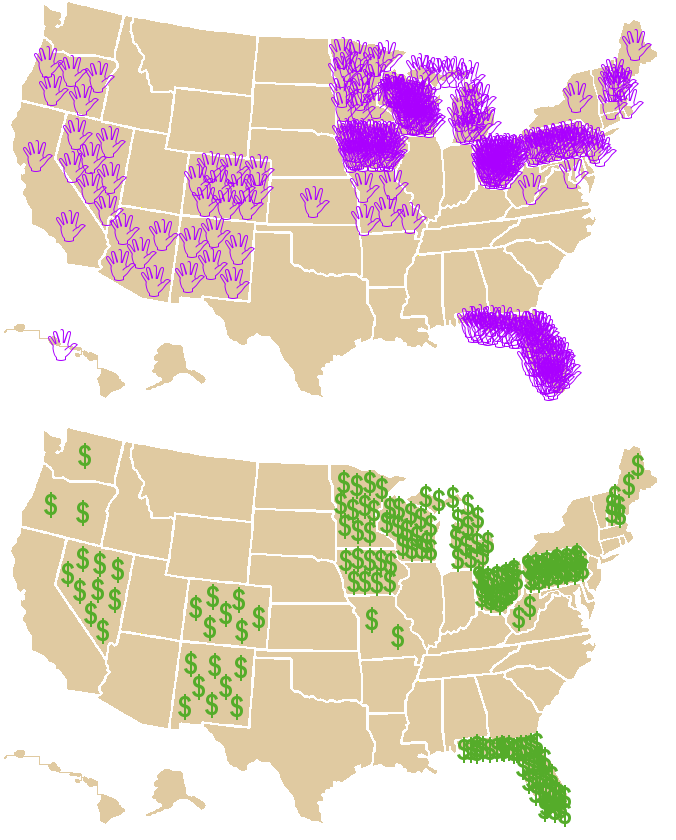Ian wrote:
What twisted logic! You and that article's writer acknowledge that Wyoming voters have more influence than they ought to have, therefore we should leave the system in place? Fuck that, and fuck Wyoming!
It's not twisted at all. It's a reflection of the countries "federalism." You know:
http://www.reference.com/browse/federalism
The interest of "one person one vote" is not the only important interest. In a federal union, like ours, the states retain a certain degree of sovereignty, and independent existence. That's why we have, for example, a Senate that has 2 members per state regardless of the size of the state. The electoral college reflects both the populations of the state and the independent status of each state, that's why they get 2 electors for being a state and then a number of electors equivalent to the number of representatives they have in Congress. It's a check and balance -- states, as independent entities, have interests and they are not exclusively determined or represented by popular votes of the citizenry.
It's not "twisted logic." It makes perfect sense.
That is not to say it can't reasonably be done another way. The US system is by no means the only way to do it, but it certainly isn't "twisted." But, naturally, go ahead and refuse to even try to see the merit in something than many people of good intention and of a high level of intelligence, education and experience, too part in creating. They're all "twisted." You are privy to the "untwisted" way.
Ian wrote:
Doing away with the EC means that there would be no Wyoming vote. No Utah vote, no Vermont vote... and no Texas vote, no California vote, etc.
Yes, I know that, Forrest. However, what we're comparing is the relative influence of Wyoming (by way of example) before and after you eliminate the EC.
Ian wrote:
I'm afraid you still missed the point.
I haven't at all. Trust me. Your point is not that complicated.
Ian wrote:
Your response kept mentioning states and how, without an EC, the smaller ones would get the shaft. No: without an EC, there would be no states. Not as far as the election was concerned.
Dude - it's you that are missing it. Just because you make the state entities irrelevant for the purposes of the Presidential election does not mean that you haven't reduced/increased particular states' populations relative influence on the election. Surely you can see that?
Now, Wyoming has 3 electoral votes - it has, using round numbers, say, 250,000 voters in Wyoming. And, let's say the total number of votes cast was 120 million.
With the EC -- Wyoming's population has a relative influence on the election of 3/538 or 0.56%.
Without the EC - Wyoming's population has a relative influence on the election of 250,000/120,000,000 or 0.21%.
See? That is why the article correctly points out that the candidates would have LESS of a reason to go to Wyoming, or any other small state, without the EC, because Wyoming doesn't offer as much of a reward.
So, with the EC, if you win all the 3 EC vote states of Vermont, Alaska, Delaware, DC, Wyoming, Montana, and South Dakota, you can take almost 4% of the total votes for President. If, without the EC, ALL of those states registered voters vote for you, you can AT MOST pick up about 1.6-1.8% of the vote, or thereabouts. The EC more than doubles the importance of those states, and therefore causes candidates to consider them more carefully, and when a tiny state is "in play' - then they will address that state's interests in order to try to win that state's votes.
Ian wrote:
Sure, candidates would have to spend more time than they do now in places like California and Texas - whaddya know, that's because there are large populations there. But heaven help the candidate who focuses on a few big states and ignores all the smaller ones!
If it's ignoring the smaller states that you are worried about, then the EC makes candidates more worried about smaller states, not less worried about them, as compared to a pure popular election. I demonstrated that above, and there are dozens of articles on the internet that discuss the same thing.
Ian wrote:
There would be no geographic battlegrounds. Two battleground states now are Ohio and Iowa. What do those states have that Michigan and Nebraska don't have? A more even political split, that's what. Much to Michigan and Nebraska's loss, who are comparitively ignored.
Going to a pure popular vote would not increase their importance over the present system. It would decrease it. Certainly, every individual in the country would have an "equal" importance as 1/120,000,000th of the election.
Ian wrote:
Besides, how much should voters in a state really care about it? I live in Maryland, but I'm a father, a taxpayer, a veteran, etc., before I call myself a Marylander.
And, you are entitled to your opinion.
Ian wrote:
A national election would bring a high voting rate from every corner of the union, just just the current battleground states.
That's a fine assertion. On what basis do you make it? What's your logic for claiming that more people would vote if the EC is eliminated than vote now?
Ian wrote:
The "battlegrounds" in a truly national election would not be decided by state borders, but rather by demographics: who can draw more of the Hispanic vote, the AARP vote, the Soccer Mom vote, the union vote, etc. That's where the battlegrounds ought to be.
That's certainly a valid opinion to have. However, it is also a valid opinion to suggest that Montana, for example, has its own peculiar interests that are not reflected in the general population centers of NYC, LA, Dallas, Chicago, Miami, DC. and their surrounding areas. Moreover, having a federal union means something The states are there for a reason, and their interests deserve to be represented.


